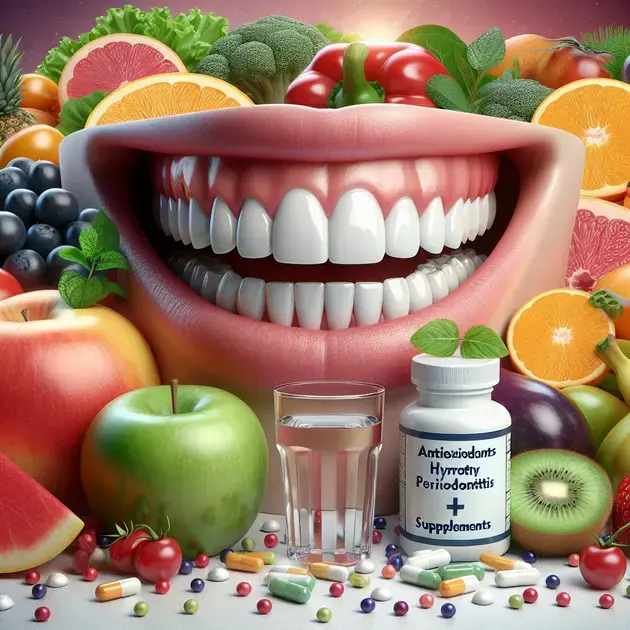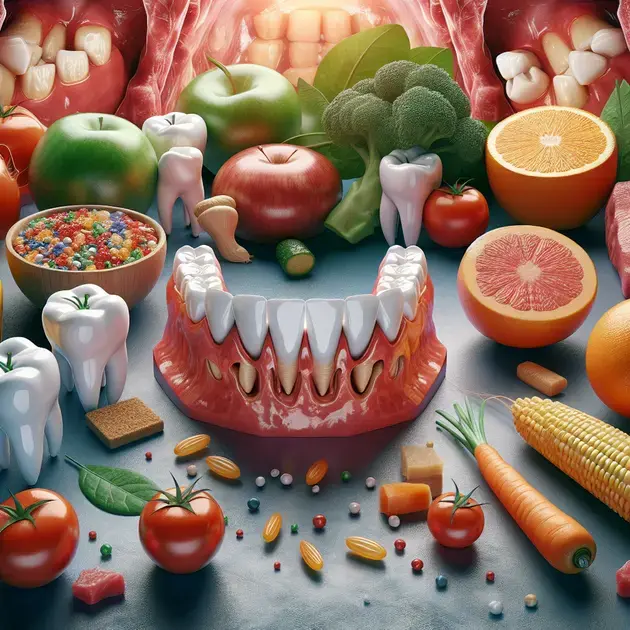When it comes to treating periodontitis, finding effective medication is crucial. This comprehensive guide aims to explore the various options available for managing periodontitis and improving oral health.
Periodontitis is a common but serious gum infection that damages the soft tissue and can destroy the bone that supports your teeth. In this guide, we will delve into the most effective medications for combating periodontitis and restoring gum health.

Effective Medication Options
When it comes to managing periodontitis, there are several effective medication options available that can help in treating the condition. These medications are often prescribed by a dentist or periodontist, and it is important to follow their recommendations closely. Here are some common medication options for periodontitis:
1. Antibiotics
Antibiotics are frequently used to treat periodontitis, particularly in cases where there is an active infection present. These medications help in fighting off the bacteria causing the infection and reducing inflammation in the gums. Common antibiotics prescribed for periodontitis include doxycycline and metronidazole.
2. Antiseptic Mouthwash
Using an antiseptic mouthwash can help in reducing bacteria in the mouth and promoting healing of the gums. Chlorhexidine mouthwash is commonly recommended for patients with periodontitis, as it has been shown to be effective in controlling plaque and gingivitis.
3. Enzyme Suppressants
Enzyme suppressants, such as tetracycline-based medications, can be prescribed to inhibit the enzymes that break down gum tissue. By slowing down this process, these medications can help in preventing further damage to the gums and supporting periodontal health.
4. Pain Medications
In cases where periodontitis causes pain and discomfort, pain medications such as ibuprofen or acetaminophen may be recommended to help in managing the symptoms. These medications can provide relief from inflammation and pain associated with the condition.
5. Anti-inflammatory Drugs
Anti-inflammatory drugs like corticosteroids may be prescribed to reduce inflammation in the gums and promote healing. These medications can help in controlling the body’s immune response to the infection, aiding in the treatment of periodontitis.
Understanding Periodontitis Treatment
Periodontitis treatment aims to address the underlying causes of the condition and restore gum health. Understanding the treatment options available can help individuals in effectively managing periodontitis and preventing further complications. Here is a breakdown of the key aspects of periodontitis treatment:
1. Scaling and Root Planing
One of the primary treatments for periodontitis is scaling and root planing, a deep cleaning procedure that removes plaque and tartar from the teeth and roots. This treatment helps in promoting gum reattachment and reducing inflammation in the gums.
2. Periodontal Surgery
In more severe cases of periodontitis, periodontal surgery may be necessary to repair damaged gum tissue and reduce pocket depths around the teeth. Procedures such as flap surgery and bone grafting can help in restoring the health of the gums and supporting structures.
3. Maintenance Therapy
After initial treatment, maintenance therapy is crucial in preventing the recurrence of periodontitis. Regular dental cleanings, thorough oral hygiene practices, and routine check-ups with a dentist or periodontist are essential in keeping the condition under control.
4. Laser Therapy
Laser therapy is a minimally invasive treatment option for periodontitis that involves using focused light energy to target and remove diseased gum tissue. This treatment can help in disinfecting the gums and promoting healing without the need for traditional surgery.
5. Nutritional Support
A balanced diet rich in essential nutrients plays a significant role in supporting periodontal health. Consuming foods high in vitamins C and D, as well as omega-3 fatty acids, can help in reducing inflammation and strengthening the immune system to fight off periodontal infections.
Tips for Managing Periodontitis
Managing periodontitis involves a combination of professional treatment and diligent home care practices to maintain gum health. By following these tips, individuals can effectively manage their periodontal condition and prevent its progression:
1. Maintain Good Oral Hygiene
Brushing at least twice a day and flossing regularly are essential for removing plaque and bacteria from the teeth and gums. Using an antiseptic mouthwash can further help in reducing bacteria and promoting gum health.
2. Quit Smoking
Smoking is a significant risk factor for periodontitis and can hinder the success of treatment. Quitting smoking can improve circulation in the gums, reduce inflammation, and enhance the effectiveness of periodontal therapies.
3. Attend Regular Dental Check-ups
Scheduling routine dental check-ups allows dentists to monitor the progress of periodontitis and intervene promptly if any issues arise. Professional cleanings and exams are essential for maintaining optimal oral health.
4. Manage Stress
Chronic stress can weaken the immune system and increase the risk of periodontal infections. Practicing stress-reducing techniques such as meditation, yoga, or exercise can help in managing stress levels and supporting overall gum health.
5. Stay Hydrated
Drinking an adequate amount of water throughout the day helps in promoting saliva production, which plays a crucial role in maintaining oral health. Saliva helps in flushing away bacteria and food particles that can contribute to gum disease.

**Understanding the Relationship Between Diet and Periodontitis**
Dietary Influence on Periodontal Health
The relationship between diet and periodontitis is a crucial aspect to consider in maintaining optimal oral health. A diet rich in nutrients such as vitamins and minerals can support the immune system and help combat inflammation in the gums. On the other hand, a diet high in sugars and processed foods can contribute to the growth of harmful bacteria in the mouth, leading to gum disease. Consuming a balanced diet with plenty of fruits, vegetables, lean proteins, and whole grains can promote gum health and reduce the risk of periodontitis.
The Impact of Sugar and Processed Foods
Sugar and processed foods are known to be detrimental to oral health, as they provide a favorable environment for bacteria to thrive in the mouth. When these bacteria accumulate along the gumline, they can cause inflammation and eventually lead to periodontal disease. Limiting the intake of sugary snacks, sodas, and carbohydrates can significantly improve gum health and reduce the risk of developing periodontitis.
The Role of Antioxidants in Oral Health
A diet rich in antioxidants, such as vitamins C and E, can help protect the gums from damage caused by harmful bacteria and inflammation. These nutrients can boost the immune system and reduce oxidative stress in the mouth, promoting healthy gums and preventing periodontal disease. Including foods like berries, nuts, leafy greens, and citrus fruits in your diet can provide the necessary antioxidants to support gum health.
The Importance of Hydration
Proper hydration is essential for maintaining good oral health and preventing periodontitis. Drinking an adequate amount of water helps wash away food particles and bacteria from the mouth, reducing the risk of plaque buildup and gum disease. Staying hydrated also promotes saliva production, which aids in protecting the gums and teeth from infections. Incorporating water as the primary beverage choice and avoiding sugary drinks can have a positive impact on gum health.
Nutritional Supplements for Gum Health
In addition to a healthy diet, certain nutritional supplements can support gum health and reduce the risk of periodontitis. Omega-3 fatty acids, probiotics, and vitamin D are some of the supplements that have been linked to improved oral health. Consult with a healthcare provider or dentist to determine the appropriate supplements for your individual needs and to ensure they complement a balanced diet for optimal gum health.
conclusão
Understanding the correlation between diet and periodontitis is fundamental in maintaining optimal oral health. A well-balanced diet rich in essential nutrients like vitamins and minerals plays a crucial role in supporting the immune system and combating inflammation in the gums. Conversely, the consumption of a diet high in sugars and processed foods can foster the growth of harmful bacteria in the oral cavity, leading to the onset of gum disease.
Sugar and processed foods create an environment conducive to bacterial proliferation, particularly along the gumline, triggering inflammation that can progress to periodontal disease. Limiting the intake of sugary snacks, sodas, and carbohydrates can significantly enhance gum health and minimize the likelihood of developing periodontitis.
Incorporating antioxidants into your diet, such as vitamins C and E from sources like berries, nuts, leafy greens, and citrus fruits, can provide a protective shield for the gums against bacterial damage and inflammation. These nutrients not only bolster the immune system but also alleviate oxidative stress in the oral cavity, ultimately fostering healthy gums and thwarting the onset of periodontal disease.



